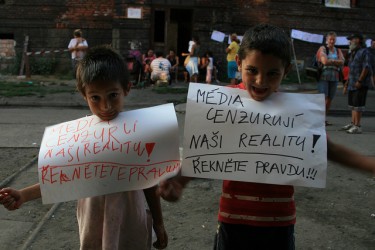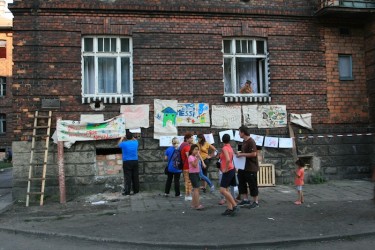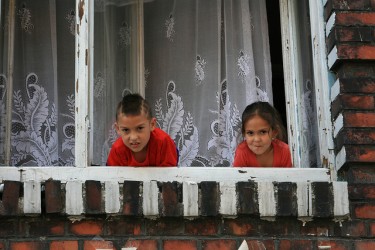Přednádraží, a small neighborhood in Ostrava, has been the site of an intense struggle against unlawful evictions of the predominantly Roma residents this summer. For the Czech Republic, this case is unique and historically significant.
The Roma community has been a subject of constant push towards social exclusion and dispossession, and the case of evictions at Přednádraží is, sadly, another spectacular example of this trend. The Roma are collectively blamed for their “nomadic lifestyle,” “lack of roots,” and “refusal to adopt to the mainstream culture.” The residents of Přednádraží decided to stand up both against the unlawful evictions and against these stereotypes.

Přednádraží children holding posters that read: “The media are censoring our reality! Tell the truth!” Photo by Daniela Kantorova.
Whilst the situation attracted the attention of the mass media during the summer, which was relatively uneventful politically, the context of historical oppression, within which the struggle has unfolded, went largely ignored. An independent news portal Romea.cz, which focuses on the life of the Roma community and their struggle for civil rights, has consistently reported on the events [cs] in detail – and from a more socially-just perspective.
History
Built in 1902, Přednádraží is a group of eleven brick apartment buildings, located in a formerly Jewish neighborhood. There are unconfirmed claims that residents of these houses were the first to be transferred to the concentration camp in Nisko, Poland, in 1939.
The Czech media call Přednádraží a ghetto, without pausing to reflect what this word means and how it might relate to history. Přednádraží, which in literal translation means “in front of the train station,” is in fact located behind the Main Train Station of Ostrava, the same train station in front of which stands the modest memorial to Ostrava’s Jewish victims of the Holocaust. Thousands of the Czech Roma perished in the Holocaust, but this memorial does not include them.
The buildings of Přednádraží are located on a triangular island, with a highway on one side, a railway depot on the other, and a plot of industrial, fenced-off land on the third, giving a sense of isolation, of being pushed into a corner. Přednádraží is difficult to access: a single bus goes there, at rare intervals, and taxi drivers tend to refuse to drive all the way into its single paved street.
The area also lacks social infrastructure. In the city that opened a brand new 14-acre mall six months ago just 4 miles away, the neighborhood adjacent to Přednádraží has only two small corner shops carrying basic (and not always fresh) food items, and a pub that, according to its manager, doubles as a community room because people have nowhere else to go. Although many children live in this neighborhood, there is no playground or any other facilities available to them.

Residents of Přednádraží and activists get ready for an anticipated raid. Photo by Daniela Kantorova.
Home for how long?
Despite the isolated nature of the neighborhood, its residents consider it their home, but the danger is that it may not be their home for much longer.
In early August, the Building Works Authority of Ostrava’s City Hall declared the houses at Přednádraží uninhabitable, citing broken sewage lines as a reason, and ordered the owner of the houses, Oldřich Roztočil, to evict all of the tenants within 24 hours. Ostrava is notorious for its lack of low cost housing, and the city hall did not offer any alternatives, other than recommending that the residents move to overpriced and overcrowded hostels.
Mr. Roztočil has decided to support his tenants, and so far has resisted the eviction order handed by the City Hall. Approximately 140 people refused to leave the houses, in which many have been living for 30-40 years. They joined forces with non-Roma activists, which is also a major step in the history of the struggle for Roma rights, as the majority of ethnic Czechs want to have nothing to do with the Roma.
The pressure from the authorities has been steadily increasing since the beginning of August, which is somewhat ironic, as the underlying reason for the evictions are the broken sewage lines. However, the sewage lines were first damaged during the floods of 1997, and their condition has declined significantly over the past two years.
As is characteristic for the mainstream narrative that tends to blame the Roma for problems that have been caused by discriminatory practices of the negligent authorities, the residents of Přednádraží have been blamed for the broken sewage lines; all this while there are at least three lawsuits taking place among the various City Hall departments in order to establish the ownership – and thus responsibility for maintenance.
A question needs to be asked: why this sudden rush to evict the residents – instead of fixing the sewage? One possible explanation is that a private college was about to be opened in the neighboring street in September, and it is likely that the area has become a target for developers. It would not be the first time that Roma people were pushed out from their homes due to forces of gentrification. In the past ten years, the Roma were forced out of a downtown area that was later developed as a sort of a party destination – on a few blocks, it features over a hundred pubs and bars.
The idea of “moving the Roma out” is often proposed by regular Czech citizens as their desired solution of the “Roma problem.” In 2006, two years after the Czech Republic’s entry into the European Union, after Canada abolished the visa requirement for the Czech citizens, representatives of Ostrava’s district Marianské Hory came up with an unbelievable scheme: they were going to encourage the Roma residents of their district to move to Canada and offer a financial contribution for their flight tickets.
In the case of Přednádraží, the authorities did not offer any assistance whatsoever. In one of the first moves, Ostrava Water Company (OVAK) switched off the water supply for all the houses, allegedly due to outstanding water bills. For three weeks, the location received its water from an expensive cistern delivered by the very same water company that switched off the water supply. It took three weeks of negotiations to restore the water supply from a single water tap to be shared by all the residents.
Next, families started experiencing difficulties receiving their social benefits. Social security workers explained to them that since they have no water supply, they are not likely to cook or wash clothes, and that without permanent housing they cannot receive housing benefits. A couple weeks after the water supply was restored into one shared tap, the authorities ordered electricity to be shut off.
Since the end of August, the city social workers have been visiting Přednádraží and threatening families with taking away their children if they do not move to the hostels immediately. All this adds up to immense psychological pressure without any concern for the well-being of the families. With no housing prospects except of unaffordable and inadequate hostels, people are naturally afraid of homelessness and having their children taken away from them.
Alliances form
In the face of all of this pressure, alliances have started forming.
The struggle has been continuously supported by the Czech-Indian Roma rights activist Kumar Vishwanathan, whose organization, Vzájemné soužití (“Living Together”; @vzajemnesouziti [cs, en] on Twitter), works on advocacy and runs social programs for the Roma community. An interview with Kumar Vishwanathan [cs] about the situation was recently published by Nový prostor, a non-profit publication benefiting the homeless.
A small number of activists from Ostrava’s chapter of a recently formed civil liberties organization ProAlt (on Facebook – here), as well as a few anti-racism activists from Prague, showed solidarity and offered help. ProAlt’s spokesperson Martin Škabraha has written extensively about the situation, and in his most recent analysis [cs] called the situation a manufactured disaster, citing the negligence of authorities, as well as the apathy of the majority population, as factors that created this crisis.
A statement of support has been issued by Milan Šimáček, the director of the governmental agency for Social Inclusion. Additionally, the European Commission has sent a letter to the Ostrava mayor, Petr Kajnar, requesting resolution of the situation.
The Czech branch of Amnesty International has also issued a statement [cs] about the situation.
All of these voices, however, have not been sufficient to get Ostrava’s district and city council to do something that would actually help Přednádraží. At this point, the situation is tense, as the families face an ultimatum from Ostrava’s social security office: either they move to the hostels, or their children will be taken away.
It is important to show solidarity with Přednádraží. If these efforts succeed, it will serve as a precedent, as an example that it is indeed possible to have roots, that it is possible to peacefully stand up against oppression enforced by institutions that have it in their job description to serve the citizens – a job in which the institutions have been failing.








10 comments
thanks. i hope this situation gets resolved soon. the authorities are sooo mean !!! and racist too !